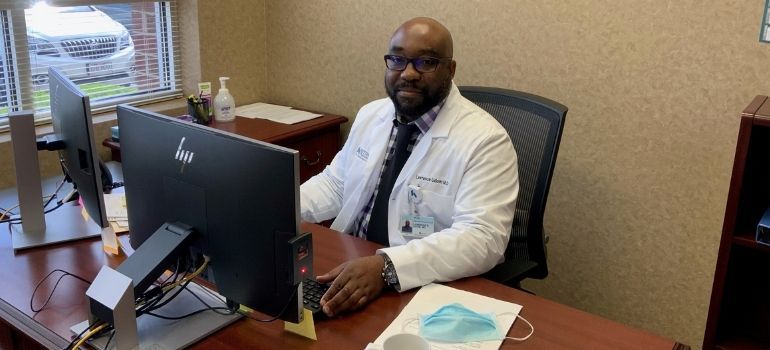Primary Care
Want to learn more about this at Kettering Health?
Mental illness is common in the United States, but it is still difficult to talk about for many people. It can be scary to admit you need help, and the thought of seeking a mental health provider can seem daunting. But you can start with someone you’re already comfortable with—your primary care provider.
Dr. Lawrence Udom, a provider trained in family medicine and psychiatry, recognizes the stigma surrounding mental health. He believes anyone can benefit from talking to their doctor.
We talked with Dr. Udom to learn more about the mental-health help available through a primary care provider. He discusses why you should share your worries, and how a doctor can help you reclaim your health.
Can you talk to your family doctor about mental health?
An estimated 1 in 5 American adults experience some sort of mental illness each year. Also, 1 in 20 adults experience serious mental health conditions. People we interact with on a daily basis are dealing with some sort of mental health condition.
Primary care providers see about 65 percent of all mental illness cases. The majority of the counseling and prescribed psychiatric medications happen in primary care.
I believe primary care providers are the ideal first step for anyone who believes they are experiencing mood symptoms. We most likely know our patients best, and subsequently, know when they are acting outside their norm.
When should a patient approach their doctor with mental health concerns?
Patients should approach their PCP anytime they feel their mental health is affecting their life. That includes relationships, their ability to experience their full range of emotions, and their ability and desire to care for themselves.
What mental health concerns are appropriate to bring to your doctor?
I think you should be able to bring all concerns to your doctor. Navigating the healthcare system is difficult, and it helps to have someone who can help you along the way. The help can come in the form of counseling, medication prescriptions, or being referred to the most appropriate place.
Areas of concern are patients who are—or feel that they are—alone and without social support, those with serious or terminal medical conditions, those with thoughts of hurting themselves or others, and those who are experiencing hallucinations or delusional thinking. These patients deserve more time and advanced levels of care.
What mental health resources can a primary care provider offer?
Your doctor will listen to your concerns and ask you questions about what you are feeling and experiencing. They will also want to make sure what you are experiencing is not because of some other medical condition. Your doctor will work with you to determine a diagnosis and develop an appropriate treatment plan, which might include lifestyle changes, counseling, medications, referral to a specialist, or closer follow-up.
When will your doctor refer you to a specialist?
Primary care providers are well-equipped to handle a wide variety of mental health conditions, including
- Depression
- Anxiety disorders
- Bipolar disorder
- ADHD
Ultimately, it depends on the comfort of the provider addressing these issues. A referral is appropriate when the doctor and patient agree that the level of care they deserve is beyond the doctor’s area of expertise.
What will your doctor talk to you about?
A doctor will want to know what you are currently experiencing, what you have experienced in the past, and any family history of mental health. Depending on the illness, you want to see how it affects day-to-day functioning, sleep, appetite, and other abilities.
Is there anything else you’d like to add?
Mental illness has the potential to affect anyone.
But it is important not to overlook those in the healthcare field. Providers experience a high rate of fatigue, depression, anxiety, and despair. This is compounded by the stress of providing care during this current pandemic.
I would encourage my colleagues who might be feeling any of the typical symptoms not just to dismiss this as burnout and seek care.
How to start the conversation?
If you have mental health concerns, talk to your primary care provider immediately. Be honest and candid—this can help you get an accurate diagnosis and on the road to recovery.










